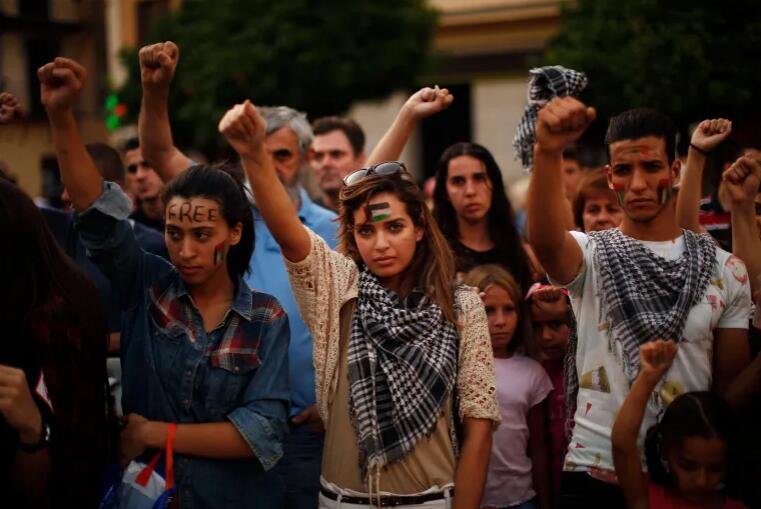On Friday, a survivor of the 1937 Guernica massacre and a Palestinian protester will sound an alarm in the Spanish marketplace bombed by a Nazi legion, to pay tribute to the victims of Israel’s bloody campaign in Gaza.
Hundreds of people in the Spanish town, which became an international symbol of the horrors of war thanks to Pablo Picasso’s masterpiece, will form a human mosaic, dressed in the red, black, white and green of the Palestinian flag.
Guernica was bombed by the Nazi Condor Legion during the Spanish Civil War, killing scores of defenceless civilians as Germany supported General Francisco Franco’s Nationalist forces.
Piccasso’s large oil painting, named after the town, portrays extreme suffering, including an image of a crying mother holding her lifeless child.
That scene within the painting will be represented at Friday’s protest, said Igor Otxoa, spokesperson for the Guernica Palestine organisation.
“We have always felt sympathy for the Palestinians because we suffered under the dictatorship and have undergone a long conflict with the Spanish state and independence groups here,” Otxoa told Al Jazeera.
The symbolic gesture is in line with Spain’s historic support of Palestinian rights, but comes at a tense time, as Madrid leads the few Western countries which are increasingly criticising Israel.

At least 15,900 Palestinians have been killed in less than two months of the latest episode of the Israel-Palestine conflict, which escalated when Hamas, the group which governs Gaza, attacked southern Israel on October 7, killing about 1,200 people and taking more than 200 captive.
Israel says its military action in the densely populated strip is designed to crush Hamas, which the United States, United Kingdom and European Union consider a “terrorist” entity.
On Monday, Palestinian health officials said that about 70 percent of the victims were women and children.
Last week, as images of child victims and bombed-out buildings flooded social media, Spanish Prime Minister Pedro Sanchez said given “the footage we are seeing and the growing numbers of children dying, I have serious doubts [Israel] is complying with international humanitarian law”.
“What we are seeing in Gaza is not acceptable,” he added.
Sanchez’s words prompted a swift response from Israel, which reprimanded the Spanish ambassador to Jerusalem and withdrew its own diplomat from Madrid.
The Spanish leader, who has also condemned Hamas for its assault, is the highest-ranking and most well-known European official to condemn Israel, joined only by politicians in Ireland and Belgium.
Meanwhile, marches in favour of the Palestinian people have been held in cities across Spain.
Josu de Miguel, professor of constitutional law at Cantabria University, described Spain as “sociologically, a pro-Palestinian country”.
Sanchez heads a minority left-wing government which includes the far-left Sumar and Podemos parties, which are outspoken in their support for the Palestinians.
“Sanchez said Spain would be prepared to recognise an independent Palestinian state. This is not the position of the European Union, therefore, it took a unilateral stance,” de Miguel told Al Jazeera.
“The Spanish [coalition] government is composed of parties which are sympathetic to the Palestinian cause and not Israel. Another factor is that in Spain, the left demonstrates more than the right.”
Spanish history with the Arab world
Some analysts believe that Spain’s solidarity with the Palestinian cause may be rooted in its own history.
Spain has only a small Jewish community of up to about 50,000 people, partly because of a historical hangover. To compare, the community in France, which is home to Europe’s largest Jewish minority, is about 500,000 people.
In 1492, with the Alhambra Decree, Catholic monarchs expelled the Jewish population. In 2015, more than 500 years later, Spain offered Jews an apology by way of granting citizenship to Sephardic Jews around the world.
During General Franco’s rule, fascist Spain, isolated by the West, was aligned with Arab states. Diplomatic relations with Israel only began in 1986 – 11 years after the dictator’s death.
“Though there is controversy over whether Franco was anti-Semitic or not, during the dictatorship Spain never recognised the state of Israel and cultivated good contacts with Arab countries,” said Ignacio Molina, an expert in Spanish foreign affairs at the Autonomous University of Madrid.
“During the transition to democracy, between 1976 and 1982, centrist governments never recognised Israel. This only happened in 1986 with the Socialist government as a condition for Spain to enter into the European Union.”
In 2014, the Spanish parliament approved a symbolic motion in favour of recognising a Palestinian state.
“There is a tradition on the left and right to be sympathetic to Palestine, even though those more on the right have supported Israel,” he said.

In November, Oscar-winning film director Pedro Almodovar was among 350 filmmakers, actors, singers and other cultural figures who signed a manifesto which condemned the “criminal terrorist actions of Hamas” but warned that the group’s attacks “could not serve to justify the genocide which Israel practices against the Palestinian people”.
Right-wing parties and Spain’s small Jewish community condemned the letter; both have also criticised Sanchez.
“The position of the Spanish government has aligned it with Hamas. It condemns the terrorism of Hamas then goes on to accept the lies from Hamas as if they are a responsible government which cares for its people,” Rabbi Mario Stofenmacher, who represents Jewish communities in Spain, told Al Jazeera.
He said Spanish society had become more polarised.
“I wear bracelets with symbols of Israel, Spain and Ukraine on my wrist, but people have challenged me strongly about the Israeli bracelet,” Stofenmacher said.
Alberto Nunez Feijoo, leader of the opposition conservative People’s Party, has united with the far-right Vox party in accusing Sanchez of shaming Spain abroad.
A survey published in November by the Electomania polling agency found 53.3 percent of Spaniards believed their country should take a more active role in trying to resolve the Israel-Palestine war, while 27.8 percent said Madrid should stay out of the conflict. About 17 percent were not sure.
An earlier survey in October also found divisions.
Some 21 percent favoured Israel while 24.3 percent backed Palestine, according to the poll for DYM. But 43 percent did not have a view about Israel and 47.6 percent felt the same towards Palestine.
“The evaluation of the government’s performance on Israel or Hamas has a huge ideological and partisan bias; support and good evaluation from voters on the left, bad from those on the right,” Jose Pablo Ferrandiz, of polling company Ipsos Spain, told Al Jazeera.
Cristina Lopez, a public relations executive from Valencia, believes geopolitics have become subsumed into domestic issues in Spain.
“Like most, if not all, aspects of life in Spain, there is a domestic political subtext behind it and the conflict in Israel and Palestine is no different,” she said.
“Sanchez’s latest words are sending a message to his coalition partners, Basque and Catalan nationalists, whose support he relies on to govern.”
Spain’s inconclusive July elections meant Sanchez was forced to enlist the support of pro-independence parties in the Basque Country and Catalonia to form a minority left-wing coalition government.
Nationalism in the Basque Country and Catalonia has meant some people in these regions are more sympathetic towards the Palestinians, because they identify with their position in relation to their powerful neighbours.
“Some people in the Basque Country, where I am from, identify with the Palestinians,” said Itxaso Dominguez De Olazabal, EU advocacy officer at the 7amleh-The Arab Center for the Advancement of Social Media, a Madrid-based think tank.
“To them, Spain is Israel and the Basque people or the Catalans are like the Palestinians. But then again to (former Catalan leader) Carles Puigdemont, Catalonia’s experience is like Israel in founding a new state in 1948.”
She believes that Spain’s political stance towards Israel is double-edged.
“On the one hand, Spain condemns Israel’s actions but both countries maintain commercial links. Israel and Spain buy and sell weapons from each other,” she said.

